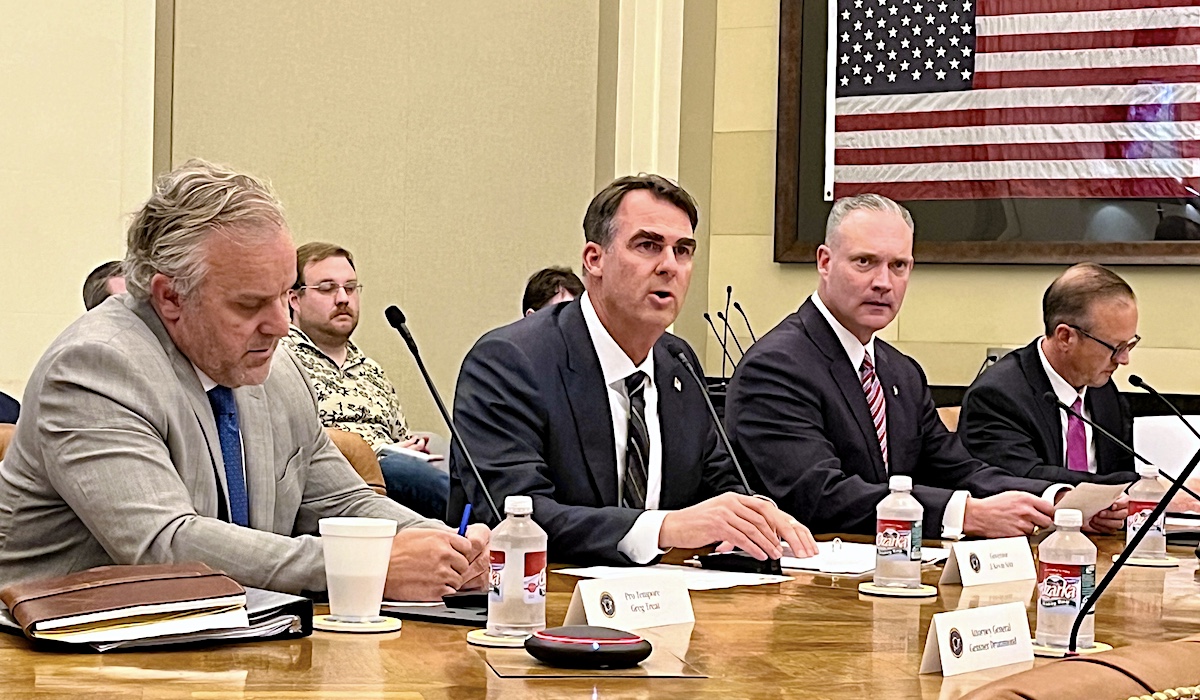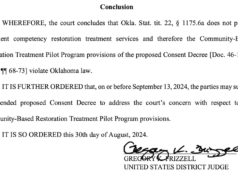

Saying she would resign before agreeing to elements of a proposed consent decree that would settle a lawsuit alleging unconstitutional delays of mental health competency restoration services in Oklahoma, Mental Health Commissioner Allie Friesen told Gov. Kevin Stitt and legislative leaders today that Attorney General Gentner Drummond “has not represented our department” and that she has terminated him as her legal representative in the federal litigation.
“I was represented inaccurately and inappropriately,” Friesen said. “I haven’t been in the business of having an attorney represent me very much or for very long, but I sure as hell know that this isn’t appropriate to be misrepresented so grossly, and to be threatened both personally and professionally — consistently — is not behavior that is remotely close to what I would want in someone representing me as a human being and especially not all 4.5 million Oklahomans who are desperate for a better mental health system.”
The hour-long meeting of Oklahoma’s Contingency Review Board — which considers major state lawsuit settlements when the Legislature is not in session — marked the strongest public criticism Drummond has faced since being elected attorney general in 2022. In September, U.S. District Court Judge Gregory Frizzell gave preliminary approval to a consent decree negotiated by Drummond and a group of Tulsa attorneys who filed suit on behalf of incarcerated Oklahomans for the extraordinary wait times they have faced in need of treatment for severe mental illness while awaiting criminal prosecution. A consent decree is a monitored settlement agreement for litigation that includes benchmarked improvement of state services.
While Friesen acknowledged the state’s failure to provide timely competency restoration services — which typically involve the administration of anti-psychotic medication — she said two components of Drummond’s proposed consent decree were “non-negotiable” for her: a requirement that the Department of Mental Health and Substance Abuse Services terminate its existing jail-based restoration program in favor of new pilot programs in two counties; and oversight components that would mean “plaintiffs’ counsel retains the ability to influence clinical decisions.”
“I will resign before I will sign the state up for an agreement like this because it goes in direct competition to what our state needs and the transformational change that needs to take place,” Friesen said.
After lengthy discussion with the board’s three voting members — Stitt, House Speaker Charles McCall (R-Atoka), Senate President Pro Tempore Greg Treat (R-OKC) — Friesen asked the State Capitol’s triarchy to reject the consent decree as drafted and preliminarily approved by Frizzell. Both McCall and Treat are leaving office in November owing to term limits.
“In light of the commissioner’s comments today, the timing and the position we’re in with this consent decree that has been entered, I move that we disapprove the consent decree,” McCall said.
McCall and Stitt voted to disapprove the proposal, while Treat abstained after citing a desire to re-read relevant documents.
Paul DeMuro, the lead attorney for plaintiffs in the class-action litigation, said all three men and Friesen should have done a better job reading.
“What occurred today was a disgraceful display of state government,” DeMuro said. “There are real people suffering, and yet these so-called ‘leaders’ would rather play out and display their political power play than address the issue. It’s a disgrace. (…) How can a governmental body purport to deliberate on an important issue when they never even read the document? Nearly everything that they said about the consent decree was false.”
In particular, DeMuro pointed to Paragraphs 58 through 63 of the proposed consent decree, noting that — contrary to Friesen’s claims — it does not mandate a specific number of competency restoration beds. And while Paragraph 58 requires ODMHSAS to shutter what DeMuro called a “sham” jail-based competency restoration program in favor of a new pilot program in Tulsa County and a yet-to-be-named county, he highlighted Paragraph 59:
Nothing in this consent decree shall be construed as preventing the department from providing class members in county jails with necessary and appropriate medications, and related mental health treatment, as prescribed by a medical professional and other mental health services (…)
“Did the commissioner also say that the world is flat and that we never made it to the moon?” quipped DeMuro, punctuating his joke with language mental health professionals would call stigmatizing. “Because her comments about the consent decree are just as crazy.”
‘We would like to see an agreement reached’

A significant amount of discussion at Tuesday’s meeting involved the details of the proposed decree, which have changed slightly from the original court filing first announced in June by DeMuro’s law firm, Frederic Dorwart. Subsequent filings on PACER.gov have specified changes, the most notable of which involves Frizzell’s ordered caveat that a new community-based pilot program set for four counties would be provisional pending legislative authorization.
“Our organization, as the defendant in this case, we did not receive the final document that was submitted on our behalf, which is reflective of the lack of representation we have been given,” said Friesen, who is named as a defendant in the lawsuit along with Debbi Moran, interim executive director of the Oklahoma Forensic Center in Vinita.
Office of Management and Enterprise Services director Rick Rose — an attorney and non-voting member of the Contingency Review Board — asked Friesen questions that stopped short of implying legal malpractice by Drummond as her attorney. But in a statement late Tuesday, Drummond enunciated a different interpretation of whom he represents in the litigation.
“My client is the state of Oklahoma, not the government agency that put us in this indefensible position. With all due respect to the commissioner, she cannot fire me — just as she did not hire me. My responsibility is to the people of our state,” Drummond said. “As there is no final consent decree, the board’s vote today is perplexing, if unsurprising. I understand the governor and speaker are afraid of the political optics of remedying this predicament in which ODMHSAS has put Oklahoma. But shirking responsibility is not an option when it will cost taxpayers untold millions of dollars. We will review our options going forward.”
Stitt, meanwhile, focused on Friesen’s nearly $100 million estimated price tag for the decree, which would last at least five years but could be extended by its contracted consultants and the court.
“As a business guy, I mean, what are the taxpayers actually on the hook for? Does this improve jail-based competency? Does this improve your ability to take care of Oklahomans, or is this just, you know, some trial attorneys getting rich off this deal?” Stitt asked Friesen. “This is $100 million with no end in sight — at a minimum — it would cost the taxpayers. I have no idea why we would be jumping to such reckless conclusions to just sign onto this thing.”
DeMuro scoffed at Stitt’s derision of “trial attorneys.”
“We have two law firms working on this with at least five lawyers that are actively working on this case. We’ve limited our fees to $75,000 a year. That’s $6,250 a month spread between two law firms,” DeMuro said. “That’s not exactly Vegas money.”
Drummond, who is in Washington preparing to argue before the U.S. Supreme Court in support of death-row inmate Richard Glossip on Wednesday morning, did not attend Tuesday’s meeting of the Contingency Review Board, which was announced Friday. He also did not attend a prior meeting Aug. 28, where McCall and Treat had previously asked Friesen questions. Treat, who had been unavailable for the Aug. 28 meeting for personal reasons, said he had hoped to hear Friesen and Drummond sit together and answer questions about the litigation.
“Believe it or not, I didn’t want to be here either, but we’re pulled into these situations, in my case on the way out the door and in your case on your way in the door,” Treat said to Friesen. “While I’m sympathetic what you are going through, I would really benefit from hearing the two of you talk side by side.”
In asking for the proposed consent decree to be voted down, Friesen acknowledged that “the waitlist and the clog has only grown and grown and grown” for Oklahomans needing mental health competency services. She also reiterated her statements from June about needing time to identify systemic problems and workable solutions after being appointed by Stitt in January, nearly a full year after the lawsuit was filed.
“The problem that we’re trying to solve is this bottleneck that has been created in this specific area of criminal justice. So the easiest way for me to kind of visualize it is that we have a clog, right? There are multiple things that contributed to that clog in the system, COVID being an enormous contributor to that,” Friesen said. “In the wish list and in conversations (with Drummond and plaintiff attorneys), we said, ‘Let’s do this with the consultants. It’s totally fair that you all would want some eyes on this. Completely valid. Let’s do it together. Let’s figure out what the root cause of the problem is.’ That opportunity has not been afforded to us. Instead, we are trying to be legally bound to this document that costs enormous unnecessary amounts of dollars to address when we don’t even have confidence as to what the root cause of the problem is. So the opportunity to actually examine the cause of the clog and to fix it in a durable way is what we need, and this document is moving us in the opposite direction.”
But after Tuesday’s meeting concluded, Friesen told media that she and her agency are prepared to announce an updated strategic plan for ODMHSAS, which will include details of an “Oklahoma plan” to dissolve the state’s mental health competency restoration clog. The branding could trigger flashbacks for health-sector advocates who recall the failed “Oklahoma plan” regarding Medicaid expansion.
“My ‘new girl’ card has expired a while ago,” Friesen said. “We are actually holding a press conference Thursday where we are going to be announcing publicly our new strategic plan. Part of that, of course, encompasses all of these improvements that we are discussing.”
Asked to elaborate on the “punishment” she claimed Drummond has “threatened” of her, Friesen said the attorney general made “generic, veiled threats around what I need to do and who may or may not be governor moving forward.”
“That if I perform, everything will be fine and we will be fine,” Friesen said.
In all, Tuesday’s sniping among state leaders and attorneys could exacerbate already high tensions. On Monday, Drummond sent Stitt a letter criticizing him for calling Tuesday’s meeting.
“Your eagerness to reject this well-considered, judicious, and altogether appropriate consent decree is bewildering. The state agency that has put Oklahoma in this indefensible position has shown minimal improvement at best. As of Sept. 23, 2024, the victims of 244 criminal defendants are being denied justice while the mental health department fails to restore competency. Thirty-five of these defendants have waited for more than a year, while seven have done so for more than two years. In the meantime, crime victims and their families have no choice but to endure their own seemingly interminable wait to see justice done,” Drummond wrote. “Because I am the chief law officer of the state and leading this litigation, I assure you I will promptly inform you when it is appropriate to convene the Contingency Review Board. When that time comes, I urge you to give serious consideration to this consent decree, the only feasible way to ensure justice while saving Oklahoma taxpayers untold millions of dollars.”
But in between their traded barbs, all parties seemed to acknowledge a goal of negotiating a plan to improve Oklahoma’s mental health competency system. Toward the end of Tuesday’s meeting, Stitt said he hoped the vote to reject the proposed decree would “put us in a better position to negotiate a consent decree that the department would potentially agree to.”
While DeMuro suggested that Tuesday’s vote by the Contingency Review Board may not have been “lawfully constituted,” he and Friesen each said they would like to hammer out their differences and achieve an improved state system.
“We would like to see an agreement reached, and I’m willing to talk to anybody as long as they deal with facts,” DeMuro said.




















